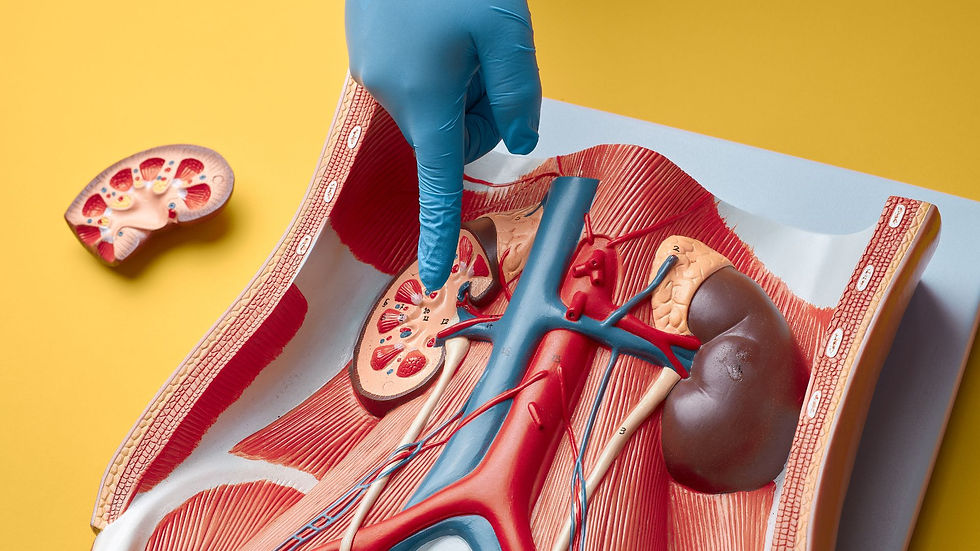How does Wegovy dosing differ for patients with kidney or liver issues?
- AJ Hill Aesthetics

- Oct 10, 2025
- 4 min read
For kidney or liver issues, the dose ladder is usually the same, but clinicians monitor more closely. No routine dose adjustment is needed for mild-to-moderate impairment, yet dehydration from nausea or vomiting can stress the kidneys, so hydration and slower titration matter. In severe impairment or if labs are changing, prescribers may pause or hold at a lower step and review more frequently. Always flag any new swelling, dramatic fatigue, very dark urine, or reduced urine output to your team promptly.
How kidney and liver function affect semaglutide handling

Wegovy (semaglutide) is broken down gradually in the body and removed through several routes, not primarily by the kidneys or liver. NICE TA875, MHRA product guidance, and clinical pharmacology data confirm that mild-to-moderate impairment of either organ doesn’t require automatic dose adjustment. Unlike some diabetes medicines that rely on kidney clearance, semaglutide binds to albumin in the bloodstream and is metabolised slowly throughout the body. This makes the drug suitable for most people with stable, mild renal or hepatic issues.
Why hydration and monitoring still matter

Although the medicine itself isn’t harsh on the kidneys or liver, indirect effects can create strain. Wegovy sometimes causes nausea or vomiting during dose increases, and fluid loss from these symptoms can worsen dehydration — a known risk factor for acute kidney injury. NHS and NICE guidance both stress hydration and slower escalation for anyone with underlying kidney concerns. Clinicians often advise drinking water regularly through the day, particularly in warm weather or during early titration weeks. If sickness or diarrhoea lasts longer than a day, patients are encouraged to contact their team to avoid dehydration-related complications.
What the research shows
Clinical trials, including STEP-1 and STEP-5, reported no increase in kidney or liver events among semaglutide users compared with placebo. Later analyses, such as those cited in Nature Reviews Nephrology (2024) and The Lancet (2024) SELECT cardiovascular outcomes study, found that semaglutide may actually protect kidney function in the long term by reducing inflammation and improving blood pressure and metabolic control. These findings are reflected in MHRA safety reports, which list dehydration — not direct kidney damage — as the main renal concern. Still, NICE and NHS clinicians recommend monitoring renal and liver function tests periodically, particularly for those with existing disease or on other medications that affect these organs.
Adjustments in more complex cases
For people with advanced kidney disease (eGFR <30 mL/min) or significant liver impairment, extra caution is used. NHS and SMC guidance indicate that while semaglutide can be considered, the approach is more gradual and individualised. Clinicians may hold at 1.0 or 1.7 mg for longer periods rather than moving quickly to 2.4 mg. If lab values fluctuate — such as rising creatinine or liver enzymes — prescribers can pause or lower the dose until stability returns. These decisions are made case by case, balancing potential benefit against comfort and safety. NICE TA875 advises that all treatment changes be supervised by clinicians familiar with both GLP-1 therapy and chronic disease management.
The importance of communication and symptom awareness

Anyone with kidney or liver conditions should tell their healthcare team about new or worsening symptoms. NHS guidance highlights four warning signs that require prompt attention: reduced urine output, very dark urine, new swelling in the legs or feet, or persistent tiredness. These could signal dehydration or strain on the organs. Clinicians may adjust hydration advice, check bloodwork sooner, or delay dose increases if these appear. It’s also important to review other medicines — particularly diuretics, ACE inhibitors, or NSAIDs — since they can interact with dehydration to affect kidney performance.
Practical strategies for staying safe

Simple preventive measures make a big difference. Drinking water throughout the day, pacing meals, and avoiding excessive caffeine or alcohol help maintain hydration. Some people find it easier to tolerate Wegovy when they eat smaller, balanced meals with moderate protein. If nausea is an issue, clinicians may recommend anti-sickness tablets or holding a dose step for an extra week. Keeping a weekly log of injection dates, fluid intake, and any side effects can help the team spot early trends. NHS nurses often remind people that maintaining hydration is part of therapy — as essential as the injection itself.
Clinical follow-up and lab reviews
Regular reviews are standard for everyone using Wegovy, but people with kidney or liver disease are usually monitored more closely. Blood tests may include eGFR, creatinine, electrolytes, and liver enzymes every few months. NICE TA875 encourages using these reviews not just to check safety, but to reinforce lifestyle habits that support organ health — such as balanced nutrition, medication review, and managing blood pressure. This integrated approach is mirrored in NHS weight-management pathways, where pharmacists, dietitians, and prescribers collaborate to adjust treatment safely.
What clinicians highlight
NICE, MHRA, and NHS guidance all agree: mild-to-moderate kidney or liver impairment doesn’t require changing Wegovy’s dose ladder. The key is hydration, gradual escalation, and regular check-ins. Severe impairment or shifting lab results call for slower titration and closer observation, not automatic discontinuation. With proper supervision, most people tolerate semaglutide well across a wide range of kidney and liver function levels.
The essential point
For people with kidney or liver concerns, Wegovy dosing generally stays the same, but monitoring and hydration become more important. Mild impairment rarely needs adjustment, while severe conditions require slower progression and more frequent reviews. NICE TA875, NHS guidance, and global trial data all reinforce this message: with careful follow-up and good hydration, Wegovy can be used safely and effectively in those with stable kidney or liver function.






Comments